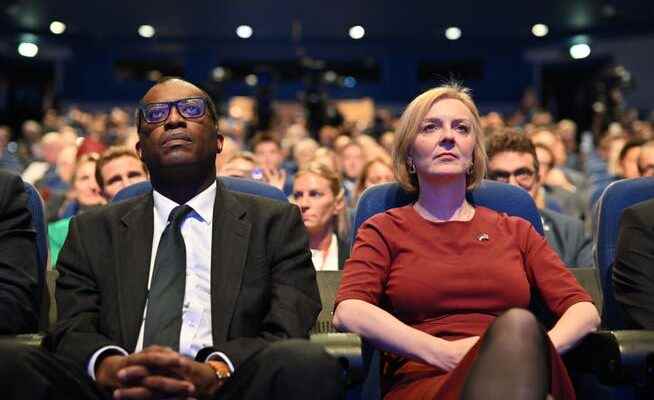The new UK government’s controversial tax plans have not only rattled markets, but also alienated many Tory MPs. Now the rebels are forcing Prime Minister Truss and Chancellor of the Exchequer Kwarteng to back down.
Kwasi Kwarteng and Liz Truss at the Tory conference in Birmingham: opposition from within the party has led them to an embarrassing backtrack.
When she took office, Liz Truss said she was not afraid to make unpopular decisions. But a month later, one of the first decisions by the new British Prime Minister and her Chancellor, Kwasi Kwarteng, has proved so unpopular that the self-declared “iron lady” Truss had to make a painful and symbolically significant about-face.
At the start of the second day of the Conservative Party conference in Birmingham, Kwarteng announced on Monday morning a relaxation of the package of unfunded tax cuts announced just a week ago on Friday. The package had spooked investors, who sent the pound on a rollercoaster ride and sent UK government bond yields skyrocketing. Now the government is waiving the abolition of the top tax rate for big earners with an annual income of over £150,000. “We understand and we have listened,” explained Kwarteng, after this measure had also met with fierce criticism within the party.
Hasty retreat
The about-face is all the more embarrassing because it was hasty. In a BBC interview on Sunday, Truss was still adamant about the tax cut for top earners. Kwarteng’s entourage had given journalists in Birmingham a preview of his party speech on Monday afternoon, in which he vowed not to deviate from the course he had taken. Now Kwarteng explainedcutting the top tax rate for high earners from 45 to 40 percent distracted from the other elements of his package and prompted him to correct course.
We get it, and we have listened. pic.twitter.com/lOfwHTUo76
— Kwasi Kwarteng (@KwasiKwarteng) October 3, 2022
The British pound appreciated against the dollar following the Treasury Secretary’s announcement. The tax breaks for high earners would only have burdened the state budget with around three billion pounds a year, which seems small given the £45bn package of unfunded tax cuts. However, from the investors’ point of view, the reversal is probably also a sign that the Truss government cannot simply evade economic and political realities.
internal resistance
Crucial to the course correction was opposition from within the party, which raised serious doubts as to whether Truss would even get the tax package through the House of Commons. Truss has convinced a majority of party members with her radical rhetoric. But within the lower house faction, doubts about Truss prevailed from the start, who struggled to take second place behind Rishi Sunak in the faction’s internal decision in July.
Brexit campaigner Michael Gove, who had held a number of key positions in Boris Johnson’s government, rose to become spokesman for the critics in Birmingham on Sunday. At a well-attended side event in Birmingham, he explained that tax cuts financed solely with new debt are just as unconservative as tax cuts from which the wealthy benefited significantly more than the general public.
Grant Shapps, who had served as Johnson’s loyal transport secretary, echoed the same message, citing the rising cost of living. “This is not the time to give gifts to those who need them least,” he wrote in an opinion piece for The Times. The Tories have plummeted in the polls since the tax plans were announced. A survey by the Yougov Institute last week put the Conservatives at 21 percent and the Labor Party at 54 percent.
Damaged Authority
With the retreat, Truss and Kwarteng have shown their ability to learn and defused an internal party conflict for the time being. In doing so, they have given themselves some political air and hope to be able to convince the group of the other elements of their tax package. But after last week’s turbulence, the government is still under pressure to finance its tax cuts with tangible austerity measures.
Truss and Kwarteng’s authority has already been damaged a month after taking office. «This lady is not for turning», Margaret Thatcher explained to her critics at the 1981 Conservative Party Congress – the phrase went down in history as an example of Thatcher’s perseverance. Truss, who likes to compare herself to Thatcher, has now caved at her first serious test as Prime Minister. Investors and critics within the party could therefore soon try to test their steadfastness again.
